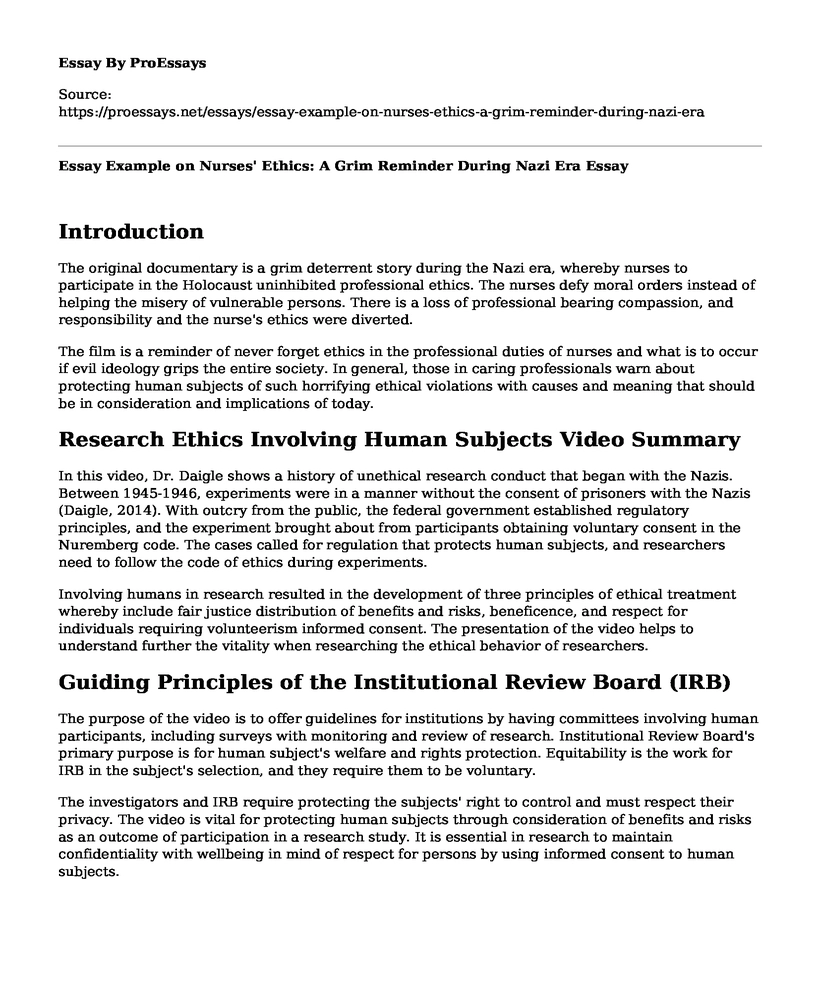Introduction
The original documentary is a grim deterrent story during the Nazi era, whereby nurses to participate in the Holocaust uninhibited professional ethics. The nurses defy moral orders instead of helping the misery of vulnerable persons. There is a loss of professional bearing compassion, and responsibility and the nurse's ethics were diverted.
The film is a reminder of never forget ethics in the professional duties of nurses and what is to occur if evil ideology grips the entire society. In general, those in caring professionals warn about protecting human subjects of such horrifying ethical violations with causes and meaning that should be in consideration and implications of today.
Research Ethics Involving Human Subjects Video Summary
In this video, Dr. Daigle shows a history of unethical research conduct that began with the Nazis. Between 1945-1946, experiments were in a manner without the consent of prisoners with the Nazis (Daigle, 2014). With outcry from the public, the federal government established regulatory principles, and the experiment brought about from participants obtaining voluntary consent in the Nuremberg code. The cases called for regulation that protects human subjects, and researchers need to follow the code of ethics during experiments.
Involving humans in research resulted in the development of three principles of ethical treatment whereby include fair justice distribution of benefits and risks, beneficence, and respect for individuals requiring volunteerism informed consent. The presentation of the video helps to understand further the vitality when researching the ethical behavior of researchers.
Guiding Principles of the Institutional Review Board (IRB)
The purpose of the video is to offer guidelines for institutions by having committees involving human participants, including surveys with monitoring and review of research. Institutional Review Board's primary purpose is for human subject's welfare and rights protection. Equitability is the work for IRB in the subject's selection, and they require them to be voluntary.
The investigators and IRB require protecting the subjects' right to control and must respect their privacy. The video is vital for protecting human subjects through consideration of benefits and risks as an outcome of participation in a research study. It is essential in research to maintain confidentiality with wellbeing in mind of respect for persons by using informed consent to human subjects.
The Belmont Report Part One Basic Ethical Principles
The video is about basic ethical principles formed by a select committee in health and human services to focus on bioethics policies. There is a summary of fundamental moral principles in the Belmont Report, and commissions recommend entirety adoption as a statement of policy. Human subjects in research within the report regard protection by behavioral or medical practice to offer therapy, have preventative treatment and diagnosis.
Justice, beneficence, and respect for persons are three basic principles that should be followed for human subjects. The autonomy of the vulnerable should be in consideration for such as children and the cognitively impaired. The report protects human rights with a summary of principles and guidelines in the work of institutional boards that governs human subject research across the United States (Sims, 2010).
Belmont Report Part Two Applying the Principles
Part two of the Belmont Report video applies to general principles requirements for consideration in research. The requirements are a selection of subjects of study, risk and benefit assessment, and informed consent. In respect for persons, the informed consent allows subjects to decide on what shall or shall not occur to them.
When informed consent is satisfied with adequate standards is when the opportunity provided. A careful array of relevant data is required to assess risks and benefits to examine whether the proper design was in use for the proposed research to protect human subjects. The selection requires proper fair procedures at levels of the social and the subject individual.
References
Reich, W. T. (2001). The care-based ethic of Nazi medicine and the moral importance of what we care about. The American Journal of Bioethics, 1(1), 64-74.
Robinson III, E. H., & Curry, J. R. (2009). Institutional review boards and professional counselling research. Counselling and Values, 53(1), 39-52.
Sims, J. M. (2010). A brief review of the Belmont report. Dimensions of critical care nursing, 29(4), 173-174.
Daigle, D. (2014, May 29). Dr. Delton Daigle research ethics [Video file]. Retrieved from YouTube website: https://www.youtube.com/watch?v=-O5gsF5oyls
Cite this page
Essay Example on Nurses' Ethics: A Grim Reminder During Nazi Era. (2023, Aug 27). Retrieved from https://proessays.net/essays/essay-example-on-nurses-ethics-a-grim-reminder-during-nazi-era
If you are the original author of this essay and no longer wish to have it published on the ProEssays website, please click below to request its removal:
- The Use of Comic in World War II Essay
- Literary Analysis Essay on Social Work with Immigration and Refugee
- Essay Sample on Cancer: Abnormal Cell Growth Leading to Tumor Formation
- Rise in Diseases: A Call for Improved Healthcare Facilities - Essay Sample
- Imogene King's KCS: Open Systems Theory for Nurses - Essay Sample
- Comprehensive Analysis of Project Needs and Costs - Essay Sample
- Paper Sample on Self-Care: Essential Practice for Attitude & Well-Being







